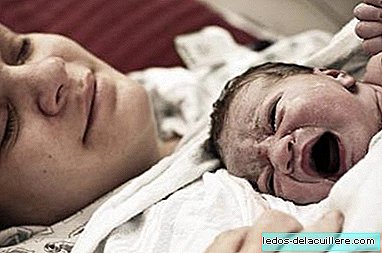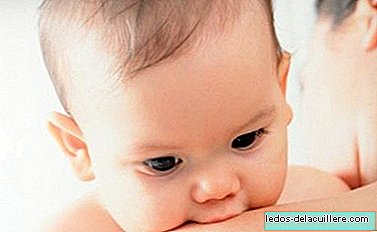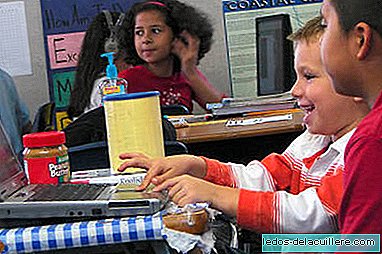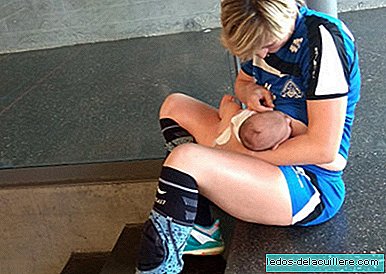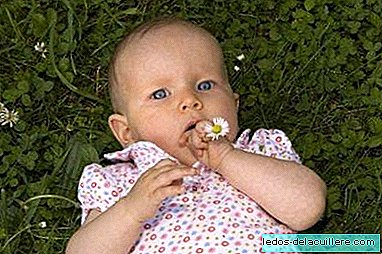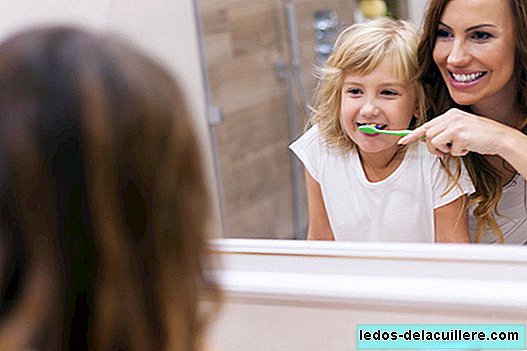
Some babies, particularly those who drink artificial milk, tend to suffer from constipation. They do the hard poopThey cry when they want to do it and sometimes they even get hurt in the ass. When it comes to helping these babies to make their stools softer, they often resort to the use of fruit juice, although it is not the only solution.
In the time that I have been in pediatrics, as a nurse, I have seen pediatricians recommend orange juice as a possible solution and I have seen mothers giving babies juice of other fruits, that is why they have "told me that this is going better." In the end, as nobody wants to see their child suffer, and less to poop, parents tend to try all possible solutions and that is why today we are going to talk about constipation and answer the question: What is the most recommended fruit juice in case the baby has constipation?
What is constipation?
Before talking about fruit, juices and other possible solutions, it is worth explaining what is constipation because many mothers believe that their babies suffer without being true. Many babies have difficulty pooping because of their immaturity. They have poop, it is liquid or pasty, they could get it out perfectly because the consistency is easy, but they don't coordinate well the desire to poop, the force to squeeze and the sphincter relaxation, so they squeeze, they even turn red, but they don't get to poop.
This adults, who do not live it, we confuse it with constipation, because we get red and squeeze when the poop is hard and it is hard for us to do it. But in babies this is not constipation. Imagine that you do loose poop, almost like diarrhea, but that when you go to the bathroom it costs you a lot. You squeeze and squeeze, but it doesn't come out, until you finally release it all. Would we call it constipation? Would you take a laxative? The answer to both questions is no. There is no problem with the poop, because it is not hard, and it makes no sense to take a laxative to make the poop more liquid when it is already. The only thing to do is wait for the baby to mature a little and, in the meantime, help him by squeezing the legs slightly towards the abdomen when he is squeezing and do a little massage in the belly in the sense of clockwise, for example.
If the same happens, if the baby squeezes but fails to poop, but when we do it we see that has made balls, or a rather elongated poop, but it lasts, then we can talk about constipation (if you do it often) and then it is worth discussing it with the pediatrician so that he gives us the appropriate indications.
What milk do you drink?
It is strange that a baby who drinks breast milk suffers constipation. Yes, it may happen that I do not poop every day, even if I do it every few days, but if when it is not hard, there is nothing to worry about. Children who drink artificial milk do have more numbers of constipation because artificial milk contains "calcium soaps", which originate by joining the fat in milk with calcium, which hardens stool.
If they are a little hard and the baby is harmed by pooping, it may happen that it starts to hold on. Note that you feel like it, but that you endure because you do not want to have a bad time. Then the picture can get worse, because if the poop stays in the detained intestine, the colon absorbs water and the poop becomes harder and harder. So until the day when the child can no longer, he has to poop yes or yes, and the cries, sweat and blood arrive in the ass for having to make a much harder poop than it was originally.
Possible solutions
If this happens, a possible solution, the first one that is usually carried out, is that of add some water in each shot. If a bottle is usually prepared with a small bowl of milk for every 30 ml of water, it is recommended to add 5 ml per ladle. That is, make the bottles with 35 ml of water per cup. In this way the water supply is greater and more water reaches the intestine that could help so that the poop is not so hard. If this does not work, you can change the milk for a modified, which are usually called "Antistreñimiento", "Digest" or similar.
Children who breastfeed, if they do it on demand, do not usually need extra water, because they suck when they want and how much they want, and they can increase the amount of liquid themselves, asking for more.
Finally, if the milk itself does not work, it tends to offer fruit juice, and now I will explain which is better and why.
Fruit juice for constipation

The first thing, as I just explained, is to make it clear that it is not the first option. That is, if a baby cannot poop because it makes hard stools, there are previous solutions such as adding water and changing milk. If this is not enough, you can give the baby some juice, although a priori, it is best not to give any food other than milk before six months.
Yes, you read correctly. Breast milk is recommended exclusively up to 6 months. If a baby does not drink it, because he drinks artificial milk, the recommendation is the same: artificial milk exclusively up to 6 months. However, we are talking about a baby with problems to poop, which is supposed to make the poop very hard and cry and suffer for it. As a "treatment" and not as much as a food, you can give some fruit juice, which can help a little.
The most used in Spain is the Orange juice, that a couple of decades ago almost all the babies were given as a system from the third month of life, so that they did not have vitamin C deficiency by drinking artificial milk. As now that problem does not occur, there is no reason to anticipate it so much and the orange is given after 6 months (although it is sometimes recommended after 4). The mechanism of action of orange juice when it comes to helping the baby poop is not very clear. It seems to have irritant capacity of the mucosa and, as a consequence, feces are softer.
One hundred grams of orange juice contain 2.4 grams of fructose, 2.4 grams of glucose, 4.7 grams of sucrose and no sorbitol, which is the type of sugar that helps make soft stools the most. If we stick to these numbers, the pear It has 6.6 grams of fructose, 1.7 grams of glucose, 1.7 grams of sucrose and 2.1 grams of sorbitol. This means that the pear is a good alternative too, because it contains sorbitol, but it is not known to what extent it is better or worse than orange because it is probably a less irritating fruit. The plum, meanwhile, has 14 grams of fructose, 23 grams of glucose, 0.6 grams of sucrose and 12.7 grams of sorbitol. With this amount of sorbitol it is clear that she is the queen of laxative fruits and, a priori, it seems the best juice to try to make stool softer, probably better than orange.
But, because everything has a "but", you have to keep in mind that a baby cannot drink much juice because the fruit juice contains water, vitamins, sugar and little else, and all the juice that a baby drinks is displacing the milk. Babies who drink a lot of juice may be malnourished for that reason, not thin, because they are eating food equally, but with different deficiencies, for drinking juice instead of milk.
So, as a treatment, the most recommended fruit juices are plum and orange and the best thing is that they are natural and that be taken with the pulp. The more smoothie, the better they take it, but the more pulp, the more fiber accompanies the juice and the more laxative power it has. Once the baby is six months old, it is best to limit them a lot (for the amount of sugar they contain and the consequent cariogenic potential) and to start eating fruit in pieces and vegetables in quantity, limiting those foods that promote constipation (rice , banana, carrot, ...) and offer them water well.



